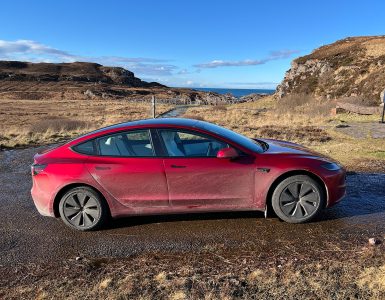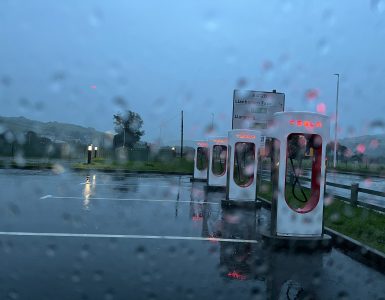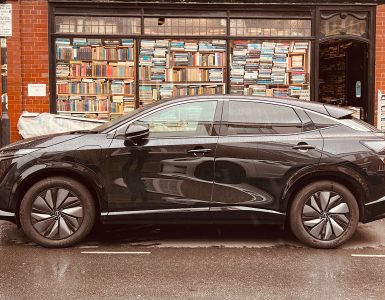There are some very common but really inaccurate misconceptions about driving electric cars that are still widely believed. One is that you can’t do high mileages or long trips in an electric car and that is takes hours to charge an EV.
So we’re doing some #EVDayTrips to bust some these myths and show what electric cars trips are really like. These extremely long trips in the UK to show you can do it in an EV.
There really is no reason and no excuse to buy another premium brand oversized diesel SUV or saloon for £35,000 or more just because you do a long trips to Cornwall, Wales, Scotland Norfolk, Gloucestershire etc. or do high mileages for work. The days of needing a piston diesel or petrol car burning fossil fuels and polluting the air in order to do a long trip are simply over. Even smaller cheaper EVs with faster charging can manage long journeys too.
London to Cornwall.. and back again in a day
In this “EV daytrip” we drove our trusty 2019 Tesla Model 3 267 miles from Putney (in SW London) to Padstow in Cornwall a few miles from Newquay. We then drove to Rock, Polzeath and Tintagel in the 4 hours we had to explore Cornwall.. Then we drove it back to London the same day – a round trip of 528 miles. For reference google maps on the morning we left said it was a 251 mile journey that would take 4 hrs and 49 mins.
Choosing an EV for longer trips – battery size and charging speed
People do long trips in all sorts of EV’s but 2 factors make it much much easier. An official range of between 200 and 350 miles helps a lot but the ability to charge to 80% in half an hour or less on DC rapid charging is crucial. To achieve this look for electric cars whose charging in kW at least double the size of their battery in kW/h.
A kilowatt-hour (kWh) is a measure of the amount of energy stored in your battery and the charging speed in kW is the amount that would be added in one hour. So if a car charged a 50kWh battery at a steady 50kW then 0-100% would take an hour while a slow AC charger at 10kW speed would take 5 hours. In reality charging speed slows from around 50% charged and becomes very slow beyond 80%. Luckily most owners will have at least 10% battery left when they start a charge and will unplug before 80% which keeps the times roughly in line.
When less well informed journalists or others refer to charging times in hours they are referring only to slow AC charging that you would use for top ups or overnight charging at home usually at a maximum speed of 7kW to 11kW. Most EVs (except Renault Zoe’s that depend on 25kW AC) can switch to fast DC CCS charging when on a trip to charge at between a pedestrian 50kW and a super fast 350kW. It’s DC charging speed that matters if you want to charge in 30 mins or under on a trip.
The trip

The stats
- The Tesla Model 3 left Putney at 0755am fully charged with an indicated range of 293mls 0755
- The whole trip was 527.9 miles and used 143kWh of electricity which works out at 271Wh/mile
- It was back in Putney at 21:55pm with 169 miles range remaining on arrival.
The charging stops
The best way to charge EV’s on a long trip is usually more short charge stops of 15 to 25 mins rather than a long single charge stop. Charging from 10% to around 60% is much much faster than charging all the way to 100% and let you stretch your legs and have a tea and toilet stop.
At 151 miles
It was time for me to have a toilet stop and grab a coffee. While stopped anyway, the Tesla refreshed itself on an Instavolt 125kW handily located at the American diner style 303 Cafe. Charging speed was a slightly disappointing 69kW but our first ever charge on Instavolt was so simple and quick.. plug in.. tap card.. charging starts. wow. The car did not need the charge. Time charging was 8 mins which added +29 miles departing with 144 miles range. Cost £3.94
At 216 miles
Tesla Supercharger stop on the Devon side of the Cornish border. Tesla do a bit of Ryanair naming here as the supercharger is in Lifton not Launceston. Located in the Arundel hotel car park there is a handy attractive deli and toilet facilities. This supercharger costs 27p per kWh which is above the Tesla average but a lot less than Exeter which is 34p! The charge took 21 mins adding +139 miles taking range from 72 miles to 211 miles for £9.45
At 317 miles
After visting Padstow, Rock, Polzealth and Tintagel via some very steep narrow Cornish roads. the Tesla needed another quick top up at Lifton to have sufficient range to reach Amesbury Supercharger easily. 14 mins added +98 miles taking the range from 97 miles to 195 miles . Cost £7.02
At 452 miles
The older Tesla Superchargers charge at 125kW or 150kW but Tesla is now rolling out their V3 chargers like at Amesbury that manage a peak speed of up to 250kW! So far my the best my Model 3 has managed on a V3 is just over 200kW but Amesbury delivered a brief peak of 249kW charge speed equivalent to 1,015 miles an hour or 169 miles every 10 mins! In a 26 minute charge I went from a range of 40 miles to 255 miles which is +215 miles for a cost of £12.88. That’s a 14% to 87% charge at an average 101kW which is pretty good for shorter charge stops I should have stopped at nearer 60%
Round trip drive was 10hrs there and back + local roads in Cornwall. Total charge time 69 mins £33.29. To go back to fully charged would have been a further £8 or so on my local 24p per kWh Ubitricity lamp post bringing the total to about 7.7p a mile using only public chargers.
Summary
Most people would regard London Padstow return as at the outer reaches of what most drivers would find feasible in a day. 528 miles may not sound massive but London to Edinburgh one way is only 407 miles while London to Inverness is 569 miles according to Google maps. The fact the Model 3 averaged 92.2% of the standard predicted range ( which on this Model 3 is based on getting 4 miles per kWh is very impressive). It’s worth noting that the car could have been charged for under 60 minutes and still reached London easily or been driven around 155 miles further making the total miles driven + remaining range around 683 miles on the same 69 minutes charge time. In fact on a journey this length staying fresh with regular short stops are what responsible drivers should do anyway.
Could a non Tesla electric car manage this with the same charging time or less? I hope some other EV owners will put that to the test in future. The Model 3 does benefit from being very efficient and having access to its own very fast reliable charging network. Cars like the Kia e-Niro & Hyundai Kona can match the efficiency but not the charging speed while cars like Audi e-Tron 55 can match the charging speed but not the efficiency. In a single direction (which after all is what a normal drive to Cornwall would be) I think many EV’s could match the charge times. On a day return I think the Model 3 still has the edge.
However the arrival later in 2021 of the roughly £40,000 Kia EV-6 and Ioniq 5 with charging as quick as a Model 3 and similar range will open up the race provided the UK can start installing some public chargers faster than 50kW.
In March 2021 an incredible 76% of new DC charger installations were still only up to 50kW speed. Of the 24% of chargers over 50kW 12% were Tesla Superchargers, 2% were Ionity 350kW units and just 8% were chargers between over 51kW and 175kW by all other networks combined. 50kW is already slow for a road trip and will be a limiting factor unless we get a majority of DC charger installations up to the 100kW to 150kW speed.















[…] on the Model 3 screen and see if any expensive ones can be avoided. For example at the time of our EV day trip from London to Cornwall we found Exeter was easily the priciest Supercharger we’d ever seen (34p) and planned round it. […]
[…] So we’re doing some #EVDayTrips to bust some these myths and show what electric cars trips are really like. These extremely long trips in the UK to show you can do it in an EV. Our first trip was Putney to Padstow and back in a day. […]
[…] cars trips are really like. These extremely long trips in the UK to show you can do it in an EV. Our first trip was Putney to Padstow and back in a day.The second was Putney to Tenby return. Including this trip to Scotland the 3 EV day trips to date […]
[…] cars trips are really like. These extremely long trips in the UK to show you can do it in an EV. Our first trip was Putney to Padstow and back in a day.The second was Putney to Tenby return while the third took it up a notch…London to Scotland […]
[…] cars trips are really like. These extremely long trips in the UK to show you can do it in an EV. Our first trip was 527 miles Putney to Padstow and back in a day.The second was 475 miles Putney to Tenby return while the third took it up a notch…671 miles […]